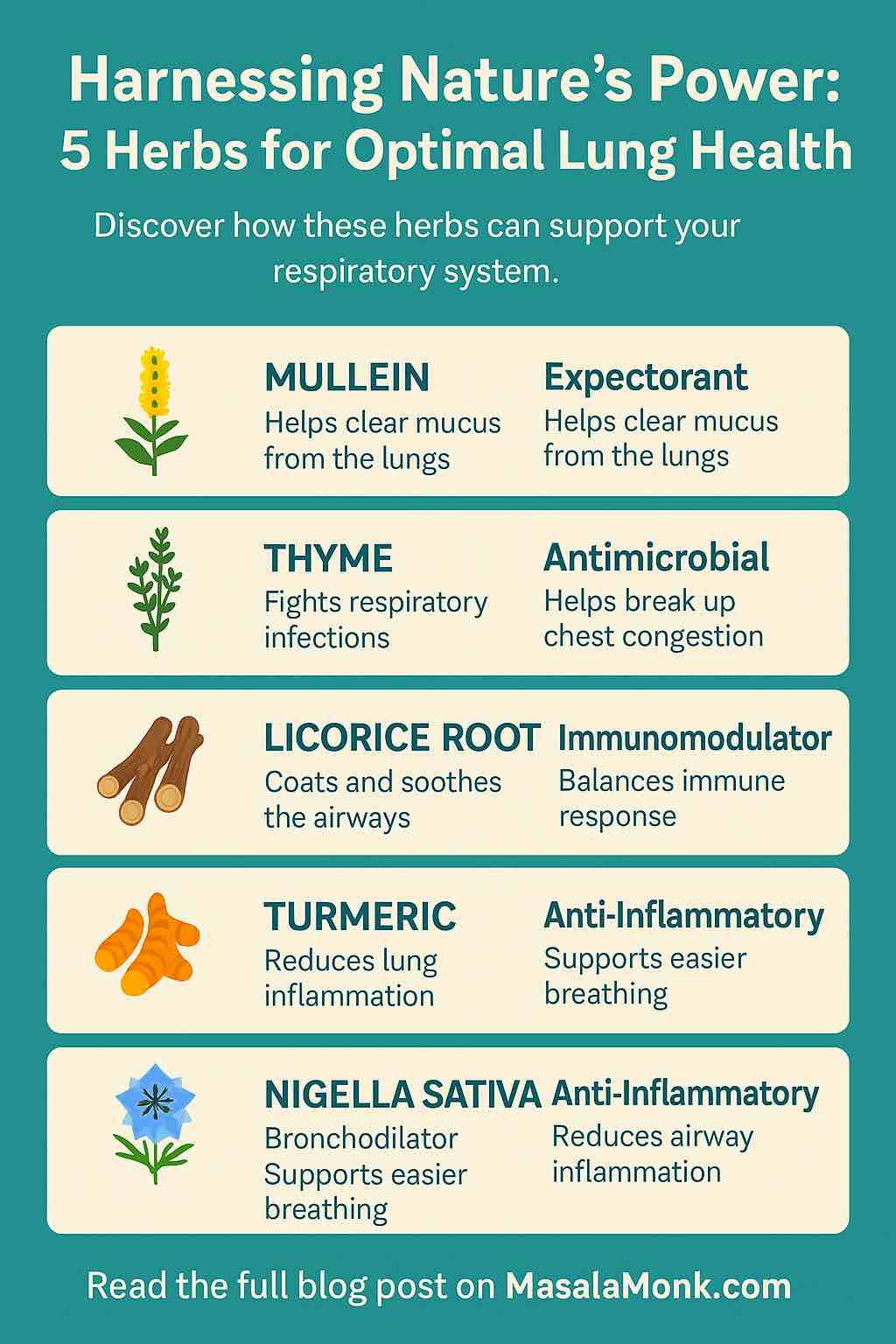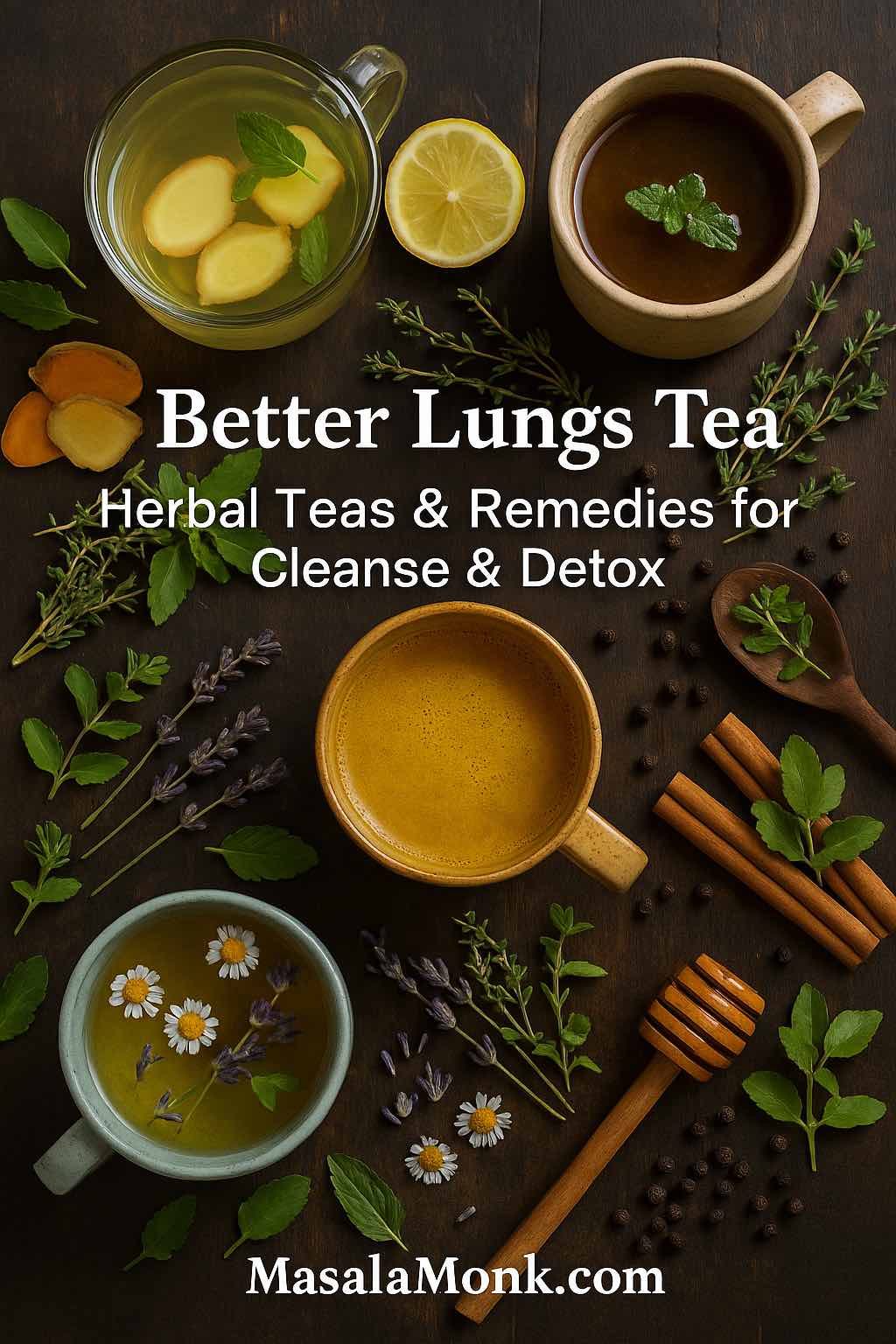
Breathing easy feels natural — until it doesn’t. In today’s world, air pollution, allergens, smoke, and stress put our lungs under constant strain. While our respiratory system has its own incredible “self-cleaning” mechanisms, there’s growing interest in how herbal teas and natural remedies can support lung health.
This isn’t about miracle “detox” claims. Instead, it’s about using nature’s herbs to soothe, comfort, and gently assist the body’s natural functions.
Let’s explore the best herbal teas, blends, and lifestyle tips for better breathing. And do not miss the 🌿 7-Day Better Lungs Tea Plan, available as a FREE PDF download in this post. Something to help you not only with easier breathing, but also better digestion, calmer sleep, and improved daily energy.
You might also like to know about 5 Herbal Teas & Brews That Help Lower Cortisol Naturally
🌬️ Do Lungs Really Need a Detox?
Our lungs naturally filter, cleanse, and repair themselves through:
- Cilia (tiny hairs) sweeping away particles.
- Mucus trapping dust, bacteria, and toxins.
- Immune cells fighting infections.
👉 What we can do is support these processes: stay active, hydrate, avoid smoke/pollutants, eat antioxidant-rich foods, and enjoy lung-friendly herbal teas.
Looking for sleep assist, Unwind and Drift Away: 5 Lemon Verbena & Spearmint Herbal Tea Recipes for Tranquil Sleep
🍵 Top Evidence-Based Herbal Teas for Lung Health
1. Green Tea (Catechin Rich)
- Science: Studies link regular green tea consumption with better lung function and reduced COPD risk. Rich in catechins and antioxidants, it helps fight oxidative stress and inflammation.
- Flavor profile: Light, grassy, slightly bitter.
👉 Blend Idea: Green Tea + Ginger + Lemon Zest for an antioxidant and warming daily brew.
Read: Discover the 5 Most Exquisite Green Teas in the World
2. Ginger Tea (Anti-Inflammatory Hero)
- Science: A 2024 trial found ginger supplements improved asthma symptoms and airway inflammation markers.
- Why it helps: Clears congestion, calms sore throats, and supports circulation.
- Flavor profile: Spicy, warming.
👉 Blend Idea: Ginger + Tulsi + Honey – immune-boosting and soothing in cold weather.
Read: Ginger for Sore Throat
3. Peppermint Tea (Menthol Freshness)
- Science: Menthol reduces the perception of breathlessness in COPD patients.
- Why it helps: Relaxes airway muscles, eases congestion.
- ⚠️ Note: Avoid if prone to acid reflux.
- Flavor profile: Cooling, refreshing.
👉 Blend Idea: Peppermint + Licorice Root + Fennel – a cooling yet smooth tea for congestion relief.
Read: Benefits of Mint and Peppermint Tea
4. Thyme Tea (Traditional Lung Tonic)
- Science: Thyme and ivy extracts are proven effective against acute cough and bronchitis in clinical studies.
- Why it helps: Antispasmodic, antimicrobial, expectorant.
- Flavor profile: Herbal, earthy.
👉 Blend Idea: Thyme + Lemon Balm + Honey – calming for cough and throat irritation.
Read: Harnessing Nature’s Power: 5 Herbs for Optimal Lung Health
5. Mullein Tea (Old-World Expectorant)
- Tradition: Used for centuries in Europe and Ayurveda for coughs, asthma, and chest tightness.
- Why it helps: Soothes irritation, may loosen mucus.
- Caution: Needs fine straining (tiny leaf hairs can irritate).
- Flavor profile: Mild, slightly sweet.
👉 Blend Idea: Mullein + Chamomile + Lavender – gentle, calming bedtime tea that supports easier breathing.
Read: Journey to Tranquil Nights: 5 Lavender & Chamomile Herbal Tea Blends for Serene Sleep
6. Tulsi / Holy Basil Tea (Sacred Herb)
- Science: Supports immunity and reduces stress hormones, indirectly helping the lungs.
- Why it helps: Adaptogen + antimicrobial qualities.
- Flavor profile: Peppery, sweet, clove-like.
👉 Blend Idea: Tulsi + Ginger + Black Pepper – a spicy, Ayurvedic “kadha”-style brew for monsoons and winters.
Read: 8 Anti-Inflammatory Drinks for Health & Wellness
7. Licorice Root Tea (Sweet Lung Soother)
- Tradition: Ancient Chinese and Ayurvedic remedy for coughs and sore throats.
- Why it helps: Coats the throat, eases spasms, and may reduce airway inflammation.
- ⚠️ Note: Overuse may raise blood pressure and affect potassium.
- Flavor profile: Naturally sweet.
👉 Blend Idea: Licorice + Peppermint + Marshmallow Root – smooth, cooling tea for coughs and sore throats.
Read: Teas for Digestion, Bloating, and Gut Health
8. Turmeric Tea (Golden Spice)
- Science: Curcumin is a strong anti-inflammatory, studied for lung fibrosis and chronic inflammation.
- Why it helps: Calms irritation, supports immunity.
- Flavor profile: Earthy, bitter, warming.
👉 Blend Idea: Turmeric + Ginger + Cinnamon + Black Pepper – a golden “Better Lungs Latte.”
Read: The Skinny on Turmeric: Can This Golden Spice Help You Shed Pounds and Improve Overall Health?
🫖 MasalaMonk Signature Tea Blends
At MasalaMonk, we believe tea isn’t just a drink — it’s an experience. Each cup can be crafted with intention, whether it’s to warm you up on a cold day, calm your nerves at night, or support your lungs when they feel heavy. These blends are designed with both traditional wisdom and modern evidence in mind.
Here are our four signature “Better Lungs” tea blends — practical, easy to prepare, and full of flavor and comfort.
🌿 1. Daily Detox Lung Support Blend
For everyday wellness & gentle lung support
If you want one reliable, go-to tea for daily sipping, this is it. Green tea forms the base, bringing in powerful antioxidants (catechins) that support lung function. Tulsi (Holy Basil) helps with immunity and stress balance. Ginger and turmeric work together as natural anti-inflammatories, while honey smooths everything out.
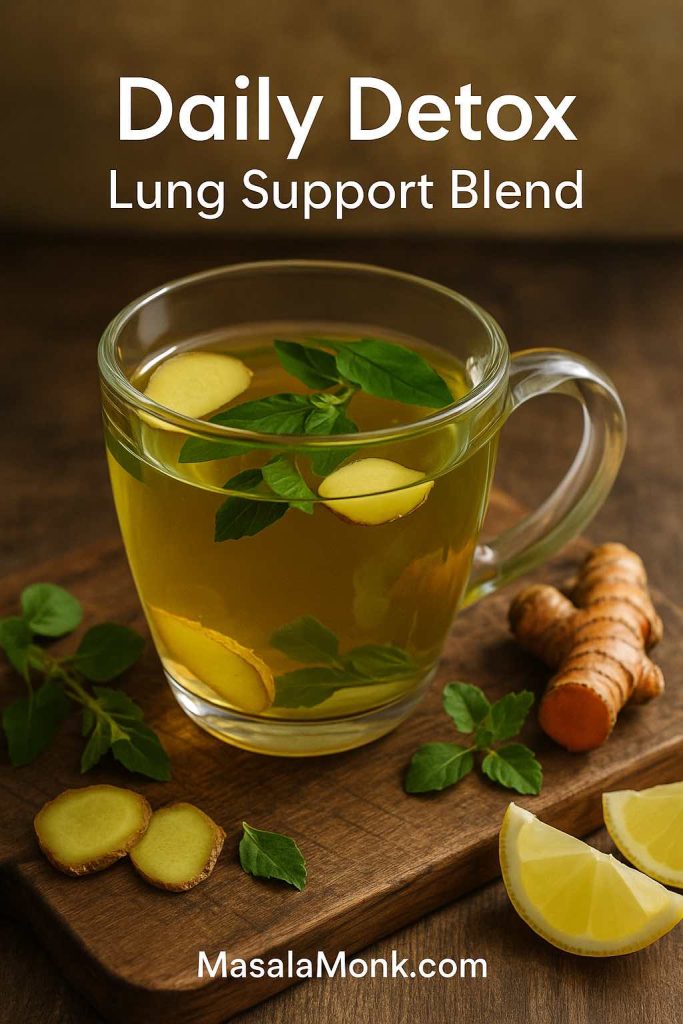
Ingredients (1 serving):
- 1 tsp green tea leaves
- 1 tsp tulsi leaves (dried or fresh)
- 2–3 thin slices of fresh ginger
- ½ tsp turmeric powder (or grated fresh turmeric root)
- Honey (optional, to taste)
Method:
- Bring 1½ cups water to a gentle boil.
- Add ginger and turmeric, simmer for 2–3 minutes.
- Remove from heat, add green tea and tulsi, cover, and steep for 5 minutes.
- Strain into a cup, add honey if desired.
👉 Curious to dive deeper into this golden root? Check out our detailed post on Ginger for Your Lungs: 5 Benefits and Practical Uses, where we unpack how ginger can support respiratory wellness beyond just tea.
Best time to drink: Morning or mid-afternoon, for a natural energy lift.
Tip: Add a squeeze of lemon for extra vitamin C (but only after the tea cools slightly, to preserve antioxidants).
🌼 2. Soothing Cough & Cold Relief Blend
For sore throats, congestion & seasonal sniffles
This blend is your cozy companion when your chest feels tight or you’re battling a cough. Thyme is a time-tested expectorant that helps loosen mucus. Mullein is gentle yet effective in soothing irritation, while licorice root coats the throat and reduces spasms. Peppermint clears nasal passages and adds a refreshing lift.
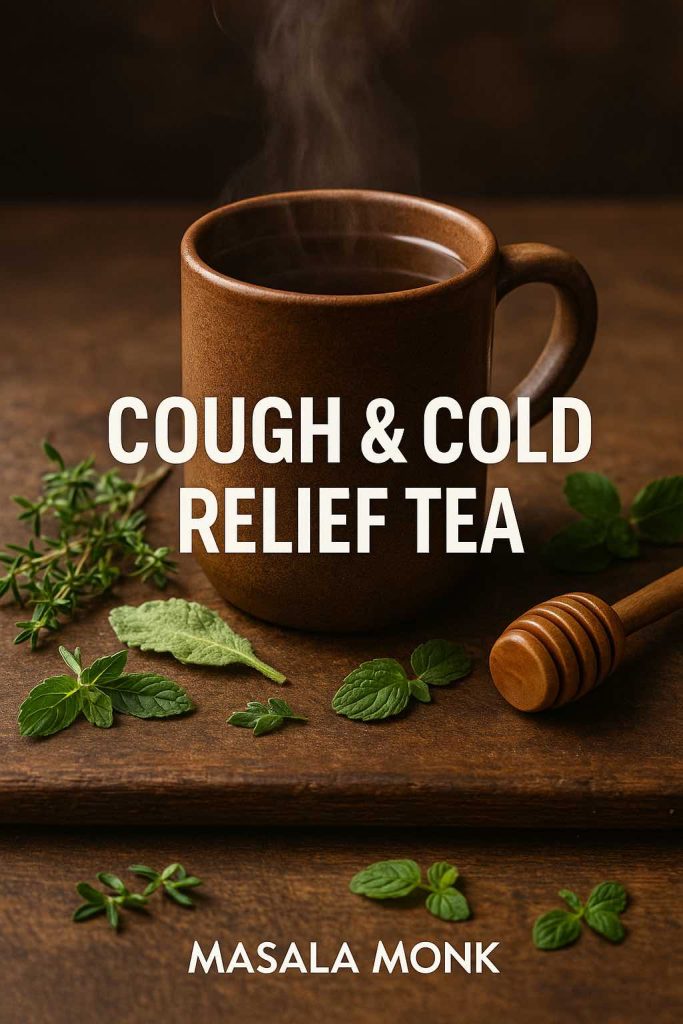
Ingredients (1 serving):
- 1 tsp thyme (dried)
- 1 tsp mullein leaves (strain well)
- ½ tsp licorice root (Mulethi)
- 1 tsp peppermint leaves
Method:
- Boil 1½ cups of water.
- Add thyme, mullein, and licorice root. Simmer for 5 minutes.
- Add peppermint, cover, and steep another 5 minutes.
- Strain carefully (especially the mullein).
👉 For more tried-and-tested home remedies, explore our guide on 14 Effective Home Remedies for Cough. From thyme teas to honey elixirs, you’ll find plenty of inspiration to keep coughs at bay.
Best time to drink: Twice a day when you’re coughing, especially before bed to ease nighttime irritation.
Tip: Add a teaspoon of raw honey if your throat is sore — honey itself is clinically proven to ease coughs.
🌙 3. Nighttime Lung Comfort Blend
For relaxation, sleep & gentle breathing support
Sometimes the hardest part of being congested is trying to sleep. This calming blend uses mullein for the lungs, chamomile for relaxation, lavender for its soothing aroma, and lemon balm for its gentle anxiolytic effect. Together, they make a cup that feels like a warm hug before bed.
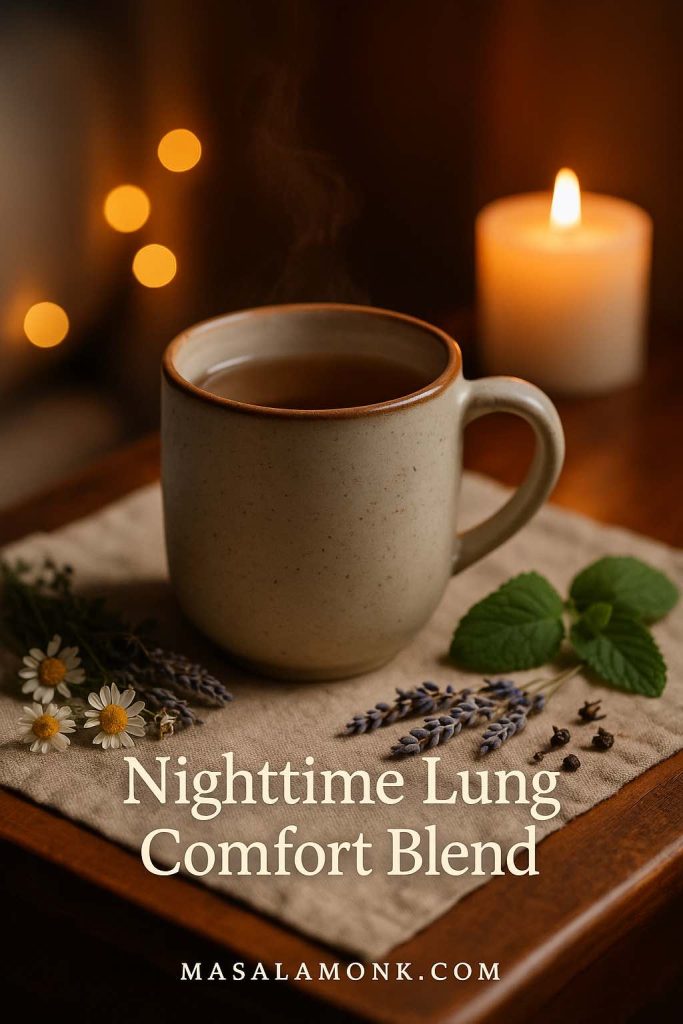
Ingredients (1 serving):
- 1 tsp mullein leaves
- 1 tsp chamomile flowers
- ½ tsp lavender buds
- 1 tsp lemon balm leaves
Method:
- Boil 1½ cups water.
- Add all herbs to a teapot or infuser.
- Pour hot water over the herbs, cover, and steep for 7–8 minutes.
- Strain well, sip slowly, and breathe in the calming steam.
Best time to drink: 30–45 minutes before bedtime.
Tip: Make this tea part of a bedtime ritual — dim the lights, put your phone away, sip slowly, and let your body wind down.
🔥 4. Ayurvedic Immunity Kadha
For seasonal transitions, immunity & clearing congestion
Inspired by Ayurveda, this kadha is warming, spicy, and deeply restorative. Tulsi, black pepper, ginger, and cinnamon all stimulate circulation, boost immunity, and support respiratory function. Turmeric ties it all together with its anti-inflammatory punch.
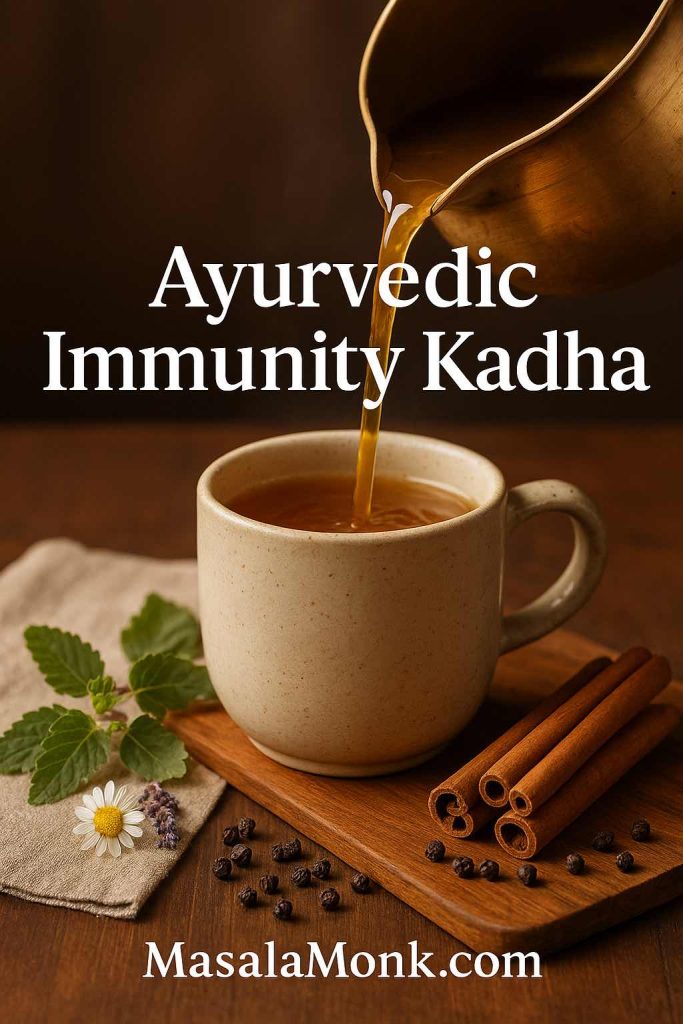
Ingredients (2 servings):
- 1 tsp tulsi leaves
- ½ tsp black peppercorns (lightly crushed)
- ½ tsp grated fresh ginger
- ¼ tsp cinnamon
- ¼ tsp turmeric powder
- 2 cups water
Method:
- Add all ingredients to boiling water.
- Simmer for 10 minutes until fragrant.
- Strain into cups and sip warm.
👉 If you love tulsi, you’ll enjoy our article on Tulsi Sweet Rose Tea and its Health Benefits. It’s a beautiful floral blend that shows how versatile tulsi can be in supporting both the body and mind.
Best time to drink: In the evening, especially during winter or when you feel the first signs of a cold.
Tip: Add a pinch of jaggery or honey if you prefer it slightly sweet.
👉 Want to explore Ayurveda further? Don’t miss our feature on Amla, Tulsi, Ashwagandha, Ginger & Turmeric: The Herbal Combo That Strengthens Immunity. It connects the dots between ancient herbal wisdom and modern immune support.
🌿 7-Day Better Lungs Tea Plan
This plan is designed for everyday support. Each day includes 3 cups of tea:
- Morning → Light & energizing, antioxidant-rich
- Afternoon → Digestive & congestion-soothing
- Evening/Night → Relaxing & lung-calming
⚠️ Note: Adjust portions to your comfort (especially with strong herbs like licorice). Always consult your doctor if you have chronic conditions.
Day 1: Gentle Start
- Morning: Green Tea + Ginger + Lemon → kickstart metabolism, antioxidant boost.
- Afternoon: Thyme Tea with Honey → supports clearing mucus, soothing coughs.
- Evening: Mullein + Chamomile → relax airways, prep for restful sleep.
Day 2: Immunity Boost
- Morning: Tulsi + Ginger + Black Pepper (Ayurvedic kadha style) → strengthens immunity, supports lungs.
- Afternoon: Peppermint + Licorice Root → cooling, helps throat irritation (skip if reflux-prone).
- Evening: Mullein + Lemon Balm + Lavender → calming, eases breathing before bed.
Day 3: Anti-Inflammatory Focus
- Morning: Green Tea + Turmeric + Cinnamon → reduces inflammation, energizes.
- Afternoon: Ginger + Thyme → spicy and expectorant, good if congested.
- Evening: Chamomile + Tulsi → soothing, balances stress hormones, lung-friendly.
Day 4: Soothing & Restorative
- Morning: Lemon Green Tea + Tulsi → light, refreshing, detoxifying start.
- Afternoon: Mullein + Peppermint → clears congestion, freshens breath.
- Evening: Chamomile + Lavender → sleep-promoting, relaxes muscles.
Day 5: Spicy Defense
- Morning: Ginger + Tulsi + Black Pepper → warming, ideal for rainy or cold mornings.
- Afternoon: Thyme + Licorice + Honey → cough-soothing, throat-protective.
- Evening: Mullein + Chamomile + Lemon Balm → gentle lung relief and calm nerves.
Day 6: Refresh & Cleanse
- Morning: Green Tea + Mint → light, cooling, refreshing for the lungs.
- Afternoon: Turmeric + Ginger → golden combo, reduces inflammation.
- Evening: Tulsi + Chamomile → calming blend, aids digestion and sleep.
Day 7: Weekend Wellness Ritual
- Morning: Ayurvedic Immunity Kadha (Tulsi, Ginger, Black Pepper, Cinnamon, Turmeric) → deep immune support.
- Afternoon: Mullein + Thyme + Honey → clears airways, reduces coughing.
- Evening: Mullein + Chamomile + Lavender → perfect wind-down ritual for restful breathing at night.
Download this 7 Day Better Lungs Tea plan as FREE PDF for Easy reference here.
☕ Tips to Get the Best Out of the 7-Day Plan
- Hydration counts: Herbal teas add to your daily fluid intake, but still drink plain water too.
- Cover while steeping: To trap volatile oils like menthol and thymol.
- Consistency is key: Benefits build up over time — don’t expect overnight “detox.”
- Cycle herbs: After 7 days, repeat or adjust blends to your taste and needs.
✨ By the end of this week, you’ll notice not just easier breathing, but also better digestion, calmer sleep, and improved daily energy.
💡 Brewing Tips for Maximum Benefit
- Always cover your tea while steeping to trap volatile oils.
- Avoid overboiling delicate herbs like green tea or peppermint.
- Use a fine mesh strainer for mullein to prevent irritation.
- Sip tea warm, not boiling hot, to avoid throat irritation.
These blends are not meant as “quick fixes,” but as daily rituals that nurture both body and mind. The warmth of a cup, the aroma of herbs, and the mindful pause while sipping all contribute to the healing experience.
⚠️ Safety & Precautions
- Licorice root: Avoid excess if you have high BP or kidney issues.
- Peppermint: Avoid if prone to GERD/acid reflux.
- Pregnancy: Stick to culinary amounts of ginger and turmeric.
- Medical conditions: Always consult your doctor for chronic lung conditions (asthma, COPD, fibrosis).
✨ Final Word
Herbal teas won’t “detox” your lungs overnight, but they can support natural lung function, reduce irritation, and bring daily comfort.
Pairing science-backed herbs like green tea, ginger, thyme, and mullein with traditional blends gives you the best of both worlds: ancient wisdom plus modern validation.
So brew a cup, inhale deeply, and let nature’s herbs help you breathe a little easier. 🌸
📖 Related Reads from MasalaMonk
Looking to explore more ways to support your lungs, immunity, and overall wellness? Here are some of our most-loved guides:
- 🌿 Ginger for Your Lungs: 5 Benefits and Practical Uses
Discover how ginger helps clear congestion, calm inflammation, and support respiratory health. - 🍯 14 Effective Home Remedies for Cough
From thyme teas to honey elixirs, explore simple remedies to ease coughs and colds. - 🌸 Tulsi Sweet Rose Tea and Its Health Benefits
A floral fusion of tulsi and rose that soothes the lungs while calming the mind. - 🔥 Amla, Tulsi, Ashwagandha, Ginger & Turmeric: The Ayurvedic Herbal Combo That Strengthens Immunity
Explore this powerful synergy of herbs for year-round respiratory and immune support. - 🌱 The Revitalizing Brew: Benefits of Cardamom Tea
Learn how aromatic cardamom can uplift your tea blends and aid in easier breathing.
❓ Frequently Asked Questions (FAQs) About Better Lungs Tea
1. Do herbal teas really detox the lungs?
Not exactly. Your lungs are self-cleaning organs — they clear out mucus, dust, and irritants naturally. Herbal teas don’t “detox” in the medical sense, but they can support lung comfort by easing inflammation, loosening mucus, and soothing the throat.
2. Which tea is best for lung health?
The most researched teas include:
- Green tea (antioxidants for lung function and COPD risk reduction)
- Ginger tea (anti-inflammatory, asthma symptom relief)
- Thyme and mullein teas (traditional expectorants for coughs)
Your choice depends on your needs — for daily use, green tea blends are great; for coughs, mullein or thyme are better.
3. Can drinking tea cure asthma, COPD, or lung disease?
No. Herbal teas cannot cure chronic conditions like asthma, COPD, or fibrosis. They may help ease symptoms (like cough or irritation), but they should always be used alongside medical treatment, not as a replacement.
4. Is it safe to drink lung-friendly herbal teas every day?
Most herbs like tulsi, ginger, thyme, and green tea are safe in culinary amounts. But:
- Licorice root can raise blood pressure if consumed in excess.
- Peppermint may worsen acid reflux.
- Pregnant women should moderate ginger and turmeric intake.
Always check with your doctor if you have chronic conditions or take medications.
5. What’s the best time to drink lung support teas?
- Morning: Green tea or tulsi-ginger blend for energy & immunity.
- Afternoon: Ginger or thyme tea to clear congestion.
- Evening/Night: Mullein + chamomile blends for relaxation & easier breathing.
6. Can kids drink these teas?
Mild teas like tulsi, chamomile, or mullein can be safe for older kids (over 6–7 years) in small amounts. Avoid strong herbs like licorice or peppermint for children, and never give honey to kids under 1 year. Always consult a pediatrician first.
7. Are there side effects of herbal teas for lungs?
Possible side effects include:
- Licorice: High blood pressure, low potassium (if overused).
- Peppermint: Acid reflux symptoms.
- Chamomile: Allergies in those sensitive to daisies/ragweed.
Most side effects occur with excessive or concentrated use, not occasional cups.
8. How do I make the teas more effective?
- Cover while steeping to trap essential oils.
- Sip warm (not boiling hot) to soothe the throat.
- Combine with good habits like deep breathing, staying hydrated, and avoiding smoke.
9. Can I buy ready-made lung detox teas?
Yes, many brands sell herbal tea blends marketed for lung health (often with mullein, licorice, or peppermint). But always read the label, check ingredients, and avoid those with added sugars or artificial flavors. Making tea at home with fresh/dried herbs is often fresher and more reliable.
10. What else helps keep lungs healthy besides tea?
Herbal teas are supportive, but the most effective lung care comes from:
- Quitting smoking & vaping
- Avoiding pollution when possible
- Exercising regularly to improve lung capacity
- Eating antioxidant-rich foods (garlic, turmeric, leafy greens)
- Practicing deep breathing exercises or yoga pranayama

